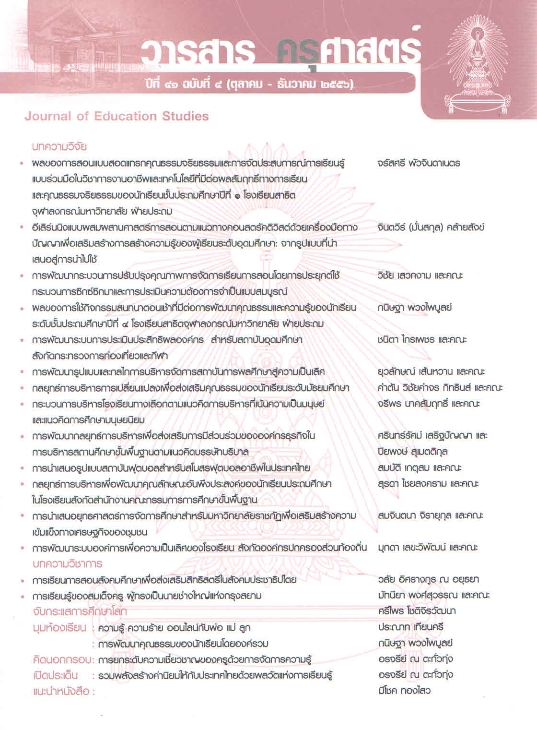การพัฒนากลยุทธ์การบริหารเพื่อส่งเสริมการมีส่วนร่วม ขององค์กรธุรกิจในการบริหารสถานศึกษาขั้นพื้นฐานตามแนวคิด บรรษัทบริบาล
Keywords:
กลยุทธ์, การมีส่วนร่วมขององค์กรธุรกิจ, บรรษัทบริบาล, STRATEGIES, INVOLVEMENT OF BUSINESS ORGANIZATIONS, CORPORATE SOCIAL RESPONSIBILITYAbstract
การวิจัยครั้งนี้มีวัตถุประสงค์เพื่อ ๑. ศึกษาสภาพและปัญหา ปัจจัยส่งเสริมและปัจจัยอุปสรรค ของการบริหารเพื่อส่งเสริมการมีส่วนร่วมขององค์กรธุรกิจในการบริหารสถานศึกษาขั้นพื้นฐานตาม แนวคิดบรรษัทบริบาล ๒. เพื่อศึกษาจุดแข็ง จุดอ่อน โอกาส และภาวะคุกคาม ของการบริหารฯ และ ๓. เพื่อพัฒนากลยุทธ์การบริหารฯ เก็บข้อมูลโดยใช้แบบสอบถาม แบบสัมภาษณ์ และแบบสำรวจ จากกลุ่มตัวอย่าง ได้แก่ ผู้บริหารสถานศึกษาโรงเรียนในฝันสู่มาตรฐานสากลจำนวน ๒๔๘ โรงเรียน ทั่วประเทศและผู้บริหารองค์กรธุรกิจชั้นนำ จำนวน ๕ แห่ง และผู้บริหารสมาคมจดทะเบียนไทย ๑ แห่ง วิเคราะห์ข้อมูลด้วยสถิติความถี่ ร้อยละ ค่าเฉลี่ย ส่วนเบี่ยงเบนมาตรฐาน และการจัดทำกลยุทธ์โดยใช้ เทคนิค SWOT Analysis และการวิเคราะห์เนื้อหาผลการวิจัยพบว่า เมื่อพิจารณาในภาพรวมสภาพของ กระบวนการมีส่วนร่วมขององค์กรธุรกิจในการบริหารสถานศึกษาขั้นพื้นฐานตามแนวคิดบรรษัทบริบาล CSR อยู่ในระดับน้อยมาก ปัญหาอยู่ในระดับน้อยที่สุด กลยุทธ์ประกอบด้วย ๔ กลยุทธ์หลัก ๑๓ กลยุทธ์ รอง และ ๙๕ วิธีกาดำเนินงาน ได้แก่ กลยุทธ์หลักที่ ๑. องค์กรธุรกิจร่วมบริหารวิชาการสู่ความเป็นเลิศ กลยุทธ์หลักที่ ๒ องค์กรธุรกิจร่วมสร้างเครือข่ายการบริหารงบประมาณเพื่อเพิ่มโอกาสทางการศึกษา กลยุทธ์หลักที่ ๓ องค์กรธุรกิจร่วมบริหารกิจกรรมเสริมหลักสูตรและพัฒนาแหล่งเรียนรู้สู่มาตรฐานสากล และกลยุทธ์หลักที่ ๔ คือ องค์กรธุรกิจร่วมพัฒนาครูมืออาชีพอย่างต่อเนื่อง
The purposes of this research were as follows: 1. To study the conditions of and problems facing the involvement of the private sector on basic education institutional management through Corporate Social Responsibility; 2. to study the supporting and limiting factors of this involvement through studying the strengths, weaknesses, opportunities, and threats; and 3. to study the development of strategies to enhance the involvement of the private sector on basic education institutional management. Data collection methods consisted of questionnaires, interview forms and surveys. The representative samples were 248 World Class Standards Lab School administrators across Thailand, 5 leading business organization administrators, and 1 Thai Listed Companies Association administrator. Data was analyzed by descriptive statistics including frequency, percentage, mean, and standard deviation; afterwards, a SWOT analysis was used to draft strategies to enhance the involvement of the private sector in basic education institutional management; this included content analysis. The research found that consideration of the general conditions was at a very low rate. The general problems facing increased involvement of the private sector were found to be at the lowest rate. There were 4 major strategies, 13 minor strategies and 95 operating processes; the major strategies included 1. business involvement in academic administration toward excellence, 2. business involvement in create budgetary management networking to increase educational opportunities, 3. business involvement in extra-curricular activities management and the development of learning resources toward international standards, and 4. business involvement in the continued professional development of teachers.
คำสำคัญ : กลยุทธ์/การมีส่วนร่วมขององค์กรธุรกิจ/บรรษัทบริบาล
Keywords: STRATEGIES/INVOLVEMENT OF BUSINESS ORGANIZATIONS/ CORPORATE SOCIAL RESPONSIBILITY




